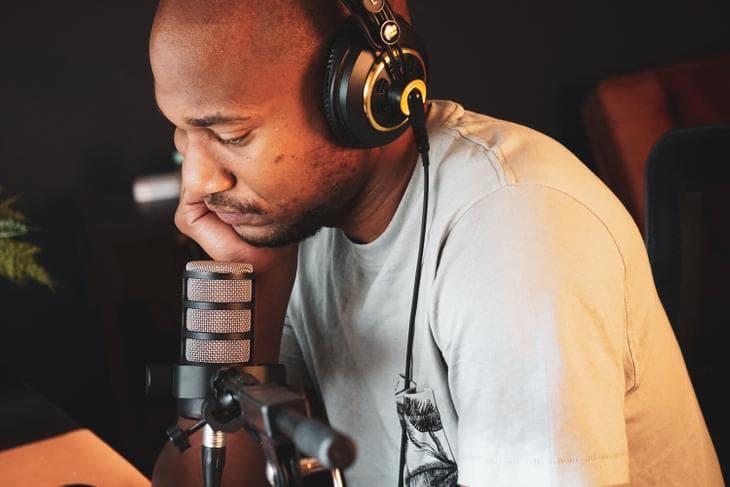How to Prepare for a Podcast Interview as a Guest in 2023
8 minutes read
podcastsmarketingsocial media

Hi! 👋
Do you have a podcast interview lined up? We will help you get prepared so that you can make the most of this wonderful opportunity!
Table of Contents
- The benefits of doing podcast interviews
- First impressions matter and why you should prepare well
- Researching the Podcast and Host
- Preparing Your Talking Points
- Practicing Your Delivery
- Getting Ready for the Interview
- Your message matters!
The benefits of doing podcast interviews
Podcast interviews are an excellent opportunity for guests to:
- Showcase their expertise
- Promote their personal brand
- Connect with a new audience
When you appear as a guest on a podcast, you have the chance to share your knowledge and insights with a targeted group of listeners who are interested in your field or industry. This can help establish you as a thought leader and build your reputation as an authority in your niche. By positioning yourself as a credible source of information, you can attract more followers, increase your social media presence, and generate leads for your business or projects.
To learn more about how podcast interviews can help showcase your expertise and build your personal brand, check out this article on Forbes: The Value Of Being A Podcast Guest, And How To Be One.
In addition to the exposure benefits, podcast interviews can also be a valuable networking tool. When you appear on a podcast, you have the opportunity to connect with the host, their audience, and potentially other guests or industry professionals. This can lead to new collaborations, partnerships, and opportunities that you may not have otherwise had access to.
First impressions matter and why you should prepare well
It's important to remember that first impressions are crucial in these scenarios, and that preparation is key to making a strong impression. By taking the time to research the podcast and host, prepare your talking points, and practice your delivery, you can ensure that you make the most of your time on the show and leave a lasting impression on the listeners.
Researching the Podcast and Host

Researching the podcast and the hosts before appearing on a podcast as a guest is an essential step in preparing for a successful interview. By doing your homework, you can gain valuable insights into the podcast's audience, format, and style, and tailor your message accordingly.
Here are the tree important steps for doing your research:
- Start by listening to previous episodes of the podcast, especially those that feature interviews with guests in your industry or on similar topics. This can help you get a sense of the podcast's style, tone, and format, as well as the types of questions that are typically asked. Additionally, it can help you avoid repeating topics or ideas that have already been discussed on the show. By showing that you've done your research and bringing fresh perspectives to the conversation, you'll be more likely to make a lasting impression on the listeners.
- Take a look at the podcast's social media presence, including its Twitter, Facebook, and Instagram accounts. This can give you valuable insights into the podcast's audience, the topics they're interested in, and the tone of the show. For example, if the podcast has a large following of tech enthusiasts, you may want to focus on technical details and jargon in your talking points. Conversely, if the podcast has a more casual tone and tends to feature lighter topics, you may want to avoid using too much industry jargon or technical language. By adapting your messaging to the podcast's audience and style, you'll be able to connect with listeners more effectively and increase your chances of making a positive impact.
- Research the podcast host's social media profiles, such as their Twitter or LinkedIn accounts, in order to get a better understanding of their background and interests. This can help you establish common ground and build rapport with the host, which can lead to a more engaging and dynamic interview. Additionally, if you can identify any topics or areas of interest that you and the host share, you may be able to steer the conversation in a direction that is more beneficial for both of you However, it's important to be authentic and avoid pandering or trying too hard to find common ground. Ultimately, the most important thing is to be well-prepared and to bring your best self to the interview.
Preparing Your Talking Points

Preparing the talking points for the actual interview is a crucial step in ensuring that you deliver a clear and engaging message. One of the first things you should do is identify the key messages that you want to deliver during the interview. These could be points that you want to emphasize, insights that you want to share or resources like books or links that you want to share. Once you've identified these key messages, make notes to help you remember them and set reminders to make sure you talk about them during the interview. This will help you stay focused and on track throughout the conversation.
Another important aspect of preparing your talking points is thinking about the overall structure of your message. This includes considering the order in which you want to deliver your key messages and how they relate to each other. By thinking about the overall structure of your message, you can ensure that your points are cohesive and easy to follow for the audience. This will also help you deliver a more compelling and persuasive message. Learn more talking points and how to structure them here.
Finally, it's important to think about anecdotes or interesting stories that you could share related to what you will be talking about. Consider stories from your own experience that illustrate your key messages. By including stories in your talking points, you can create a more compelling and memorable message that will resonate with the audience long after the interview is over.
Practicing Your Delivery

One of the most important aspects of delivering a strong podcast interview is speaking with confidence and clarity. One effective technique for achieving this is to practice speaking from the stomach. This involves taking deep breaths and speaking from the diaphragm, which can help you project your voice more effectively and avoid sounding nasal. Additionally, practicing good breathing techniques can help you stay calm and focused during the interview, which can help you come across as more confident and knowledgeable.
Recording and listening to yourself speaking is another great way to practice for a podcast interview. Using your phone or software like Audacity, you can record yourself speaking and then listen back to identify areas for improvement. This can help you catch any speaking habits or tics that you may not be aware of, such as speaking too quickly or using filler words like "um" or "like." Additionally, listening to yourself speak can help you identify areas where you need to improve your pronunciation or enunciation, which can be especially important if you have a strong accent or are speaking in a language that is not your first language.
Practicing with a partner can also be a valuable tool for preparing for a podcast interview. Consider practicing a few potential questions with a friend or colleague who can provide feedback on your delivery, pacing, and overall presentation. This can help you identify areas for improvement and refine your messaging in a safe, low-pressure environment. Additionally, practicing with a partner can help you get more comfortable with the conversational nature of podcast interviews and prepare you for any unexpected twists or turns in the conversation. By taking the time to practice and refine your delivery, you can ensure that you make the most of your time on the podcast and leave a lasting impression on the listeners.
Getting Ready for the Interview

Before the podcast interview begins, it's important to set up your equipment and ensure that everything is working properly. This includes testing your microphone, headphones, and webcam (if applicable) to ensure that the audio and video quality are clear and consistent. If you're using a video camera, be sure to adjust the lighting and camera angle to create a professional-looking shot. Additionally, consider putting your phone in airplane mode to avoid distractions and interruptions during the interview.
It's also important to find a quiet, distraction-free location for the interview. This may mean closing the door to your office or finding a room in your home that is removed from noisy pets, children, or other distractions. Consider letting others in your household know that you'll be recording a podcast interview and ask them to avoid interrupting or making noise during the interview. Additionally, test your internet connection to ensure that it's stable and fast enough for the interview.
Checkout 10 Tips for Better Podcast Audio Quality for more information on nailing down the quality of your audio.
Finally, be sure to arrive early to the virtual meeting and set expectations with the host about the time you have available for the interview. This can help ensure that the conversation stays on track and that you have enough time to cover all of the topics you'd like to discuss. Additionally, take a few minutes to review your notes and practice your delivery before the interview begins. By arriving prepared and ready to engage in a meaningful conversation, you can make the most of your time on the podcast and leave a lasting impression on the audience.
Your message matters!

Preparing for a podcast interview can be nerve-wracking, but it's important to remember that you have valuable insights and perspectives to share with the audience. By taking the time to prepare and practice, you can ensure that you deliver a clear, engaging, and memorable performance that will leave a lasting impression on the audience. So take a deep breath, trust in your expertise, and go out there and crush your podcast interview!